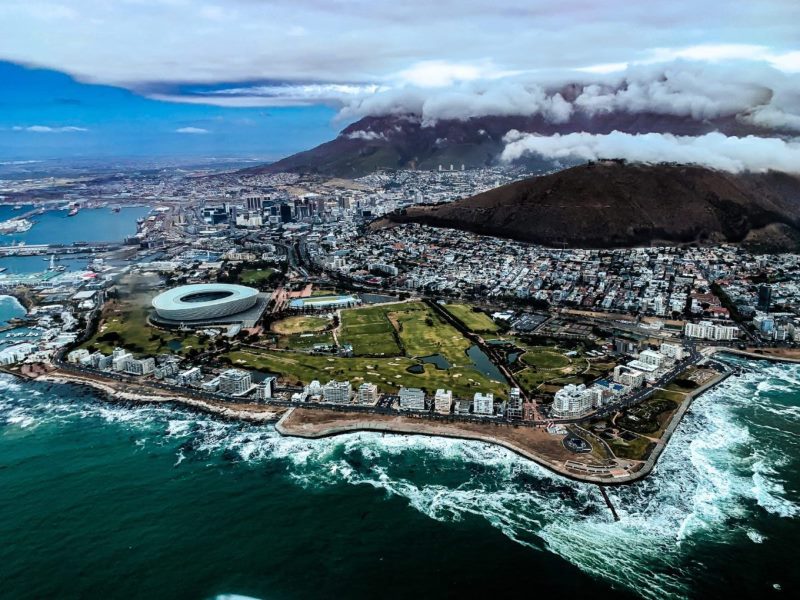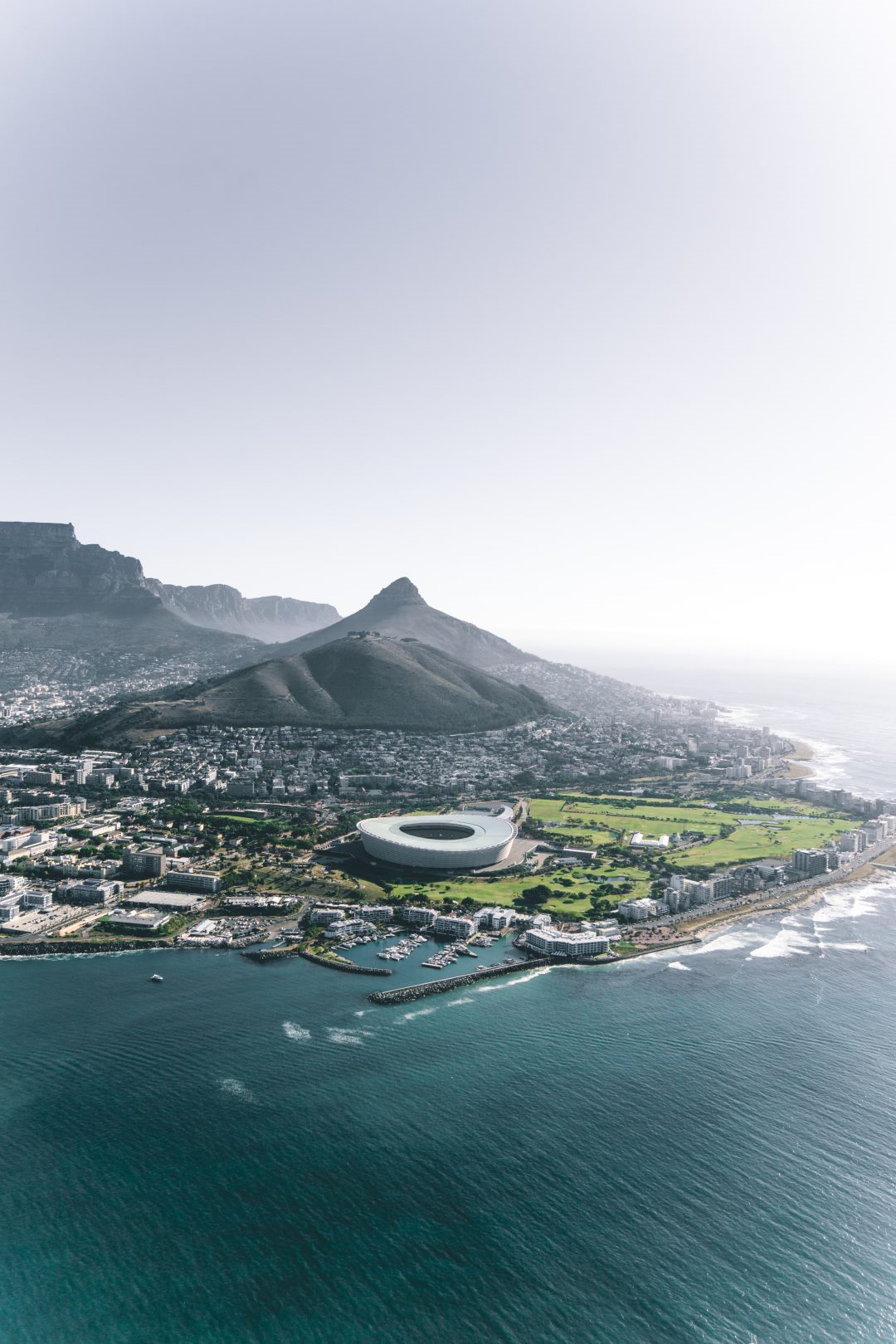Cape Town is known for its captivating beauty, rich history, and cultural diversity. And what better way to experience this than by visiting some of its world-renowned museums? From art and history to science and nature, Cape Town is home to a wide range of museums that cater to every interest. In this post, we will explore the best museum visits in Cape Town, highlighting their unique features and why they are a must-see for anyone visiting the Mother City. So, get ready to immerse yourself in the fascinating world of Cape Town’s museums!
The 2 Best Museums in Cape Town
The 2 Best Museums in Cape Town
1. Steam Train Ticket Elgin Railway

This tour offers a unique perspective of Cape Town and its surroundings aboard a steam train. The 160 km round-trip takes guests on a journey through the Sir Lowrys Pass, offering breathtaking views of False Bay and the surrounding mountains before arriving in the Elgin Valley. The valley is known for its apple production, with the district producing 60% of the national apple crop, 40% of which is exported annually.
Guests are free to enjoy their time on the train as they please, whether it be socializing in the bar, catching up with family, reading a book, or taking in the sights. During the tour, guests can also partake in local food, craft gin and beer, and live music at the Railway Market.
This is a one-of-a-kind experience that is sure to create lasting memories.
2. Robben Island Ticket Half Day

Discover the history of South Africa with a visit to the Robben Island Museum. This half-day tour includes shared hotel pick-up and drop-off, a guided boat trip to the island and a museum ticket. Your shared guide/driver will take you to your accommodation in Cape Town within a 6km radius to begin your tour at 10:00 AM.
The Robben Island Museum tour is an excellent opportunity to better comprehend South Africa’s history, beginning with the Dutch and British colonial periods and including the country’s 20th-century transformation and current efforts at reconstruction and forgiveness.
Please keep in mind that confirmation will be received at the time of booking, and the experience is not wheelchair accessible. The tour is offered year-round, and travelers of all ages will be able to participate. The experience necessitates excellent weather, and if it is canceled due to poor weather, you will be offered a different day or a full refund. This experience necessitates a minimum of six passengers. If the minimum is not met, the activity will be cancelled. We look forward to revealing the fascinating history of Robben Island with you.
The Most Frequently Asked Questions About Cape Town
Cape Town is one of the most popular tourist destinations in South Africa, known for its natural beauty, vibrant culture, and fascinating history. If you’re planning a trip to this city, you might have many questions about what to do, where to stay, and how to stay safe. In this post, we’ll answer some of the most frequently asked questions about Cape Town and help you plan a fun and safe trip.1. What Are The Best Tourist Attractions In Cape Town?
Cape Town is home to many incredible tourist attractions that cater to all interests. Some of the must-visit places include:- The iconic Table Mountain, which offers breathtaking views of the city and surrounding areas
- Robben Island, where Nelson Mandela was imprisoned for many years
- The V&A Waterfront, which is a hub of entertainment, shopping, and dining
- Kirstenbosch Botanical Gardens, which is home to many indigenous plants and offers stunning walking trails
- The beaches, such as Camps Bay, Clifton and Muizenberg, which offer excellent surfing and sunbathing opportunities.
2. How Can I Stay Safe In Cape Town?
Like any big city, Cape Town can be unsafe at times, especially if you’re not familiar with the area. Here are some tips to stay safe:- Always be aware of your surroundings and keep an eye on your belongings
- Don’t walk alone at night, especially in secluded areas
- Only use registered taxis or Uber when travelling at night
- Avoid displaying expensive cameras, jewellery or electronic devices in public areas
- Try to stay in well-lit and busy areas
3. What Is The Weather Like In Cape Town?
The weather in Cape Town is known to be quite unpredictable. During the summer months (December-February), the temperature averages around 25°C, with occasional heat waves reaching over 30°C. In the winter months (June-August), the temperature can drop to around 10°C with occasional rainstorms. It’s always a good idea to pack clothing suitable for different weather conditions.4. Which Neighborhoods Should I Visit In Cape Town?
Cape Town has many unique neighborhoods, each with its own character and charm. Some of the most popular neighborhoods include:- The City Bowl, which is the central business district and home to notable landmarks such as Table Mountain and the Cape Town Castle.
- Bo-Kaap, which is known for its colorful houses and rich Muslim culture
- Green Point, which is a trendy neighborhood with excellent restaurants and bars
- Woodstock, which is an up-and-coming area with galleries, cafes and street art
5. When Is The Best Time To Visit Cape Town?
Cape Town is an excellent destination to visit all-year-round, but the best time to go depends on your preferences. For sunny beach weather, the best time is in the summer months (December-February). However, it’s also the busiest time of year, so expect large crowds and higher prices. An ideal time to visit is during the shoulder season of March-May or September-November, when the weather is still pleasant but the crowds are smaller.6. What Is The Local Currency In Cape Town?
The local currency in Cape Town, as well as the rest of South Africa, is the South African Rand. Most shops, restaurants, and hotels accept major credit cards, but it’s always best to carry some cash as well. Be sure to familiarize yourself with current exchange rates before travelling.7. What Are The Best Restaurants In Cape Town?
Cape Town is a food lover’s paradise, with an array of high-quality restaurants catering to all tastes and budgets. Some of the best include:- Pot Luck Club, which is a trendy tapas-style restaurant with stunning views of the city
- The Test Kitchen, which is a fine dining establishment that consistently ranks as one of the best restaurants in the world
- La Colombe, which serves innovative French cuisine in a beautiful mountain setting
- Eastern Food Bazaar, which is a bustling food market serving delicious Indian and Middle Eastern food at reasonable prices.
Conclusion
Cape Town is a fantastic travel destination that offers something for everyone. Whether you’re interested in beaches, culture or history, this city has plenty to offer. We hope that we’ve been able to answer some of the most frequently asked questions about Cape Town and that you’re inspired to visit this wonderful city. Remember to stay safe, plan ahead and enjoy your trip!
Cape Town, South Africa is not only known for its stunning natural beauty, but also for its rich history and vibrant culture. One of the best ways to explore this city’s diverse past and present is by visiting its incredible museums. From art and history to science and heritage, Cape Town offers a plethora of museum experiences that are sure to captivate and educate. In this post, we will explore some of the best museum visits that Cape Town has to offer, with something for everyone to enjoy.
The 2 Best Museums in Cape Town
The 2 Best Museums in Cape Town
1. Steam Train Ticket Elgin Railway

This 160 km round-trip by rail takes guests on a unique journey from Cape Town to Somerset West via the 473m high Sir Lowrys Pass, providing unbeatable views of False Bay and the surrounding mountains, before finally reaching the picturesque Elgin Valley. Renowned for its apples, Elgin is one of the most intensively farmed districts in Southern Africa and produces 60% of the national apple crop.
Guests will have the opportunity to relax and catch up with friends and family whilst sipping on a custom cocktail or experience local food, craft gin, beer, and live music at the Railway Market. Whether mingling in the bar, reading a book, or taking in the sights, guests have the freedom to enjoy their time on the train as they please.
2. Robben Island Ticket Half Day

Explore the history of the fight against apartheid by visiting Robben Island, where Nelson Mandela was imprisoned for 18 years. With this half-day tour, you’ll get to experience a boat trip from Cape Town to the island, where you’ll be able to visit the prison and other historical sites.
The Robben Island Ticket Half Day tour includes shared hotel pick-up and drop-off transfers, as well as a shared guide/driver and vehicle. You’ll also get a museum ticket which grants you access to all the historical sites on the island.
Pick-up starts at 10:00 AM, and you will be picked up at your accommodation within a 6km radius of Cape Town. The tour is not wheelchair accessible, but it is accessible by public transportation. Most travelers can participate, and the tour has a maximum of six travelers.
Confirmation will be received at the time of booking, and the tour is non-refundable and cannot be changed for any reason. If the tour is canceled due to poor weather, a different date or a full refund will be offered. The tour requires a minimum number of travelers, and if it’s canceled because the minimum isn’t met, a full refund will be given.
Experience history and learn about South Africa’s past with the Robben Island Ticket Half Day tour, operated by Beyond Africa Safaris (Pty) Ltd.
Frequently Asked Questions About Cape Town
If you’re planning a trip to South Africa, Cape Town undoubtedly should be on your list of places to visit. Known for its stunning beaches, scenic mountains, and vibrant culture, Cape Town offers an unforgettable experience to all its visitors.However, it’s natural for travelers to have a few questions when planning a trip to an unfamiliar place. Below are some of the most frequently asked questions about Cape Town that will help you plan your trip better.1. What’s the best time to visit Cape Town?
Cape Town has a Mediterranean climate, which means that it experiences hot, dry summers and wet, mild winters. The peak season for tourism in Cape Town is from November to February, which is summer in South Africa. However, keep in mind that this is also the busiest and most expensive time to visit. If you want to avoid the crowds and save money, visit Cape Town during the shoulder season, which is from September to November or April to May.2. Is Cape Town safe for tourists?
Like all big cities, Cape Town has its fair share of crime. However, if you take the necessary precautions, your chances of experiencing any problems are low. Avoid walking alone at night, don’t flash your valuables, and always keep an eye on your belongings, especially in crowded areas. It’s always a good idea to ask locals or your hotel staff about the safest places to visit and avoid.3. What are the must-see attractions in Cape Town?
Cape Town has plenty of attractions to offer, whether you’re interested in nature, history, or culture. Some of the most popular attractions include:- Table Mountain: Take a cable car to the top of this iconic mountain for breathtaking views of the city and the ocean.- Robben Island: Visit the prison where Nelson Mandela was held for 27 years and learn about the history of apartheid in South Africa.- Cape of Good Hope: Take a scenic drive to the southernmost point of the Cape Peninsula and see the spot where the Atlantic and Indian Oceans meet.- Kirstenbosch Botanical Gardens: Walk through this stunning botanical garden and see a variety of plant species that are unique to South Africa.4. What’s the transportation system like in Cape Town?
Cape Town has a public transportation system that includes buses, trains, and minivans called taxis. However, the system can be unreliable and unsafe, especially at night. It’s recommended to use Uber or other ride-sharing apps for transportation within the city. If you plan on renting a car, keep in mind that South Africans drive on the left-hand side of the road.5. What should I bring with me to Cape Town?
Cape Town has a moderate climate, so bring comfortable clothes that can be layered. Don’t forget to pack sunscreen, sunglasses, and a hat, as the sun can be strong. If you plan on hiking, bring sturdy shoes and a backpack. If you’re traveling to Cape Town during the winter, bring a jacket or warm sweater for the cooler evenings.6. What’s the food like in Cape Town?
Cape Town has a diverse food scene that reflects its multicultural population. You can find anything from traditional South African dishes like boerewors and biltong to international cuisine like sushi and pizza. Seafood is also popular in Cape Town, given its proximity to the ocean.7. Can I drink the tap water in Cape Town?
The tap water in Cape Town is safe to drink, but some people might find it has an odd taste due to the high mineral content. It’s recommended to drink bottled water if tap water doesn’t suit your taste.8. What’s the currency used in Cape Town?
The currency used in South Africa is the South African Rand (ZAR). You can exchange your money at banks or currency exchange offices, but keep in mind that some businesses don’t accept credit cards, so it’s a good idea to have some cash on hand.9. Do I need a visa to visit Cape Town?
If you’re traveling to Cape Town from a non-visa exempt country, you’ll need a visa to enter South Africa. You can apply for a visa at your nearest South African embassy or consulate.10. What’s the nightlife like in Cape Town?
Cape Town has a vibrant nightlife scene with plenty of bars, nightclubs, and live music venues. Long Street in the city center is known for its nightlife, but there are also plenty of other areas to explore, such as the trendy neighborhoods of Kloof Street and Bree Street.In conclusion, Cape Town is a beautiful city that offers a variety of attractions and experiences for all types of travelers. By following these frequently asked questions, you’re sure to have a safe and enjoyable trip to this stunning destination.Cape Town is home to some of the best museums in South Africa. Each museum offers a unique insight into the history and culture of the city and its people. If you’re someone who loves to learn about the past and explore different art and artefacts, then a visit to Cape Town’s museums should definitely be on your bucket list. In this post, we have put together some of the best museum visits in Cape Town that you must not miss out on. From historical museums to contemporary art galleries, there’s something for everyone in this beautiful city. So, let’s dive in and explore the best museums that Cape Town has to offer.
The 2 Best Museums in Cape Town
The 2 Best Museums in Cape Town
1. Robben Island Ticket Half Day

Discover the historical significance of Robben Island with this half-day tour. Your shared guide/driver and vehicle will pick you up at your accommodation within a 6km radius of Cape Town at 10:00 AM. From there, you’ll embark on a boat trip to the island, where you can explore its museum and experience its cultural significance.
The tour includes a roundtrip boat trip and the entrance fee for the museum. However, meals, drinks, and gratuities are not included. Confirmation will be received at the time of booking, and the tour has a maximum capacity of six travelers. Please note that the tour isn’t wheelchair accessible, but it’s near public transportation, and most travelers can participate.
While the experience requires good weather, if it’s canceled due to poor weather, you’ll receive a full refund or be offered an alternative date. The experience also requires a minimum number of travelers, and if it’s canceled due to not meeting the minimum, you’ll receive a full refund.
Join this immersive and educational tour with Beyond Africa Safaris (Pty) Ltd to explore the island’s historical significance and cultural importance.
2. Steam Train Ticket Elgin Railway

This 160 km round-trip by rail takes you east from Cape Town to Somerset West over the 473m high Sir Lowrys Pass affording majestic views over False Bay and the surrounding mountains and finally into the Elgin Valley. The Elgin Valley being synonymous with apples is one of the most intensively farmed districts in Southern Africa producing 60% of the national apple crop (of which 40% is exported annually). Guests spend their time on the train doing what they enjoy best whether mingling in the bar, reading a book, taking in the sights, catching up with family or closing their eyes and sipping on a custom cocktail. Live music, local food, craft gin, and beer are available at the Railway Market. Experience Cape Town and surrounding areas from a unique perspective and capture panoramic views of Cape Town and False Bay over Sir Lowrys Pass. A relaxing tour that will transport you back to a time when rails dominated transport.
Exploring Cape Town: Answers to the Most Frequently Asked Questions
Cape Town, also known as the Mother City, is a popular tourist destination with something for everyone. From the stunning views of Table Mountain to the beautiful beaches, Cape Town has many attractions that are sure to impress. In this post, we will answer some of the most frequently asked questions about Cape Town and provide some tips and insights for travelers.1. What is the best time of year to visit Cape Town?
The best time to visit Cape Town is during the summer months, from November to February. During this time, the weather is warm and sunny, with an average temperature of around 25°C (77°F). It is also the peak tourist season, so expect larger crowds and higher prices. If you prefer a quieter experience, consider visiting during the spring months, from September to November, or the fall months, from March to May.2. How do I get around Cape Town?
There are several options for getting around Cape Town, including renting a car, taking public transportation, or using ride-sharing apps like Uber or Bolt. The MyCiTi bus system is a popular and affordable option for travelers, with buses running regularly throughout the city. Taxis are also available, but be sure to negotiate the fare before beginning your journey.3. What are the must-see attractions in Cape Town?
There are many must-see attractions in Cape Town, including:- The iconic Table Mountain, which offers stunning views of the city
- The V&A Waterfront, a bustling shopping and dining destination
- The historic Robben Island, where Nelson Mandela was imprisoned for 18 years
- The Kirstenbosch National Botanical Garden, which showcases the unique flora of the region
- The beaches of Clifton and Camps Bay, which are popular for swimming and sunbathing
4. Is Cape Town safe for tourists?
Like any major city, Cape Town has its share of crime, particularly in certain areas. However, if you take basic precautions like sticking to well-lit areas, avoiding carrying large amounts of cash, and not flashing valuable items, you should be fine. It is also a good idea to refrain from walking alone at night and to take a taxi or ride-sharing service instead.5. What is the local currency in Cape Town?
The local currency in Cape Town is the South African rand (ZAR). It is widely accepted throughout the city, and you can exchange currency at banks or currency exchange offices. Many businesses also accept credit cards, so be sure to bring your card with you.6. What is the food like in Cape Town?
Cape Town has a vibrant food scene, with a wide range of cuisine options available. Some popular dishes include:- Bunny chow, a hollowed-out loaf of bread filled with curry
- Braaivleis, a South African-style barbecue
- Bobotie, a spicy meat dish with a custard topping
- Cape Malay curry, a spicy curry with a sweet undertone
7. What is the nightlife like in Cape Town?
Cape Town has a vibrant nightlife, with many bars and clubs open late into the night. Long Street is a popular destination for party-goers, with a wide range of bars and clubs to suit all tastes. The V&A Waterfront is also home to several bars and restaurants with live music and entertainment.8. What are the best day trips from Cape Town?
There are many great day trips from Cape Town, including:- The Cape Peninsula, which offers spectacular coastal views and the chance to see penguins up close
- The Stellenbosch wine region, which is home to some of South Africa’s best vineyards and wine estates
- The Garden Route, a scenic drive along the southern coast of South Africa with beautiful beaches and forests
- The Cederberg Mountains, which offer hiking and rock-climbing opportunities in a stunning natural setting
Conclusion
Cape Town is a beautiful and exciting destination with something for everyone. By following these tips and insights, you can make the most of your visit to this amazing city.Cape Town is a city overflowing with culture and artistic heritage. With its rich history and diversity, it’s no wonder that this South African city boasts some of the most fascinating museums in the world. Whether you’re a history buff or an art connoisseur, Cape Town’s museums offer something for everyone. From galleries filled with contemporary African art to museums showcasing ancient fossils and indigenous artefacts, this city has it all. In this post, we’ll take you on a journey through the best museum visits in Cape Town, so you can explore the city’s culture and art scene to the fullest.
The 2 Best Museums in Cape Town
The 2 Best Museums in Cape Town
1. Robben Island Ticket Half Day

Explore the fascinating history of South Africa with a half-day tour to Robben Island. Enjoy shared hotel pick-up and drop-off transfers, along with a shared guide/ driver and comfortable vehicle. You’ll also receive a Robben Island museum ticket and boat trip.
The tour begins with a comfortable 6km-radius pickup at your accommodation in Cape Town. You’ll then ride a boat to Robben Island, where you can explore the prison where Nelson Mandela was held captive for 27 years.
Please note that this tour requires good weather conditions to proceed, and it is not wheelchair accessible. However, it’s near public transportation and most travelers can participate. Confirmation will be received at the time of booking.
Please remember that this tour has a maximum of 6 travelers and is operated by Beyond Africa Safaris (Pty)Ltd. The tour policy is a non-refundable payment and is subject to cancellation due to poor weather conditions. However, if the cancellation is due to lack of the minimum number of travelers, you’ll be offered an alternative date or a full refund.
2. Steam Train Ticket Elgin Railway

This unique 160 km round-trip by rail east from Cape Town to Somerset West, over Sir Lowrys Pass and finally into the Elgin Valley offers panoramic views of the surrounding mountains and False Bay. The Elgin Valley is renowned for being the hub of apple farming in Southern Africa, producing 60% of the national apple crop, 40% of which is exported annually. The journey allows for leisure time, where guests can enjoy a custom cocktail and local food and drinks while listening to live music at the Railway Market. Passengers are free to do as they please, whether to mingle in the bar, take in the sights, or spend time reading a book. The serene sounds of the rail add to the charm, transporting passengers back to a slower era. Don’t miss this unique experience to capture the beauty of Cape Town and the surrounding areas from an unforgettable vantage point.
The Top Frequently Asked Questions About Cape Town, South Africa
If you’re considering a trip to Cape Town, South Africa, you may have questions about the city’s history, weather, attractions, and culture. Here are the most frequently asked questions about Cape Town, along with answers that will help you plan your trip.1. What is the history of Cape Town?
Cape Town is one of the oldest cities in South Africa, founded in 1652 by Dutch colonialist Jan van Riebeeck. The city served as a stopover for ships traveling from the east to the west, and as a result, it attracted settlers from Europe, India, and Southeast Asia. In the 19th century, Cape Town became the seat of the South African government and played a crucial role in the country’s struggle against apartheid.2. What is the climate like in Cape Town?
Cape Town has a Mediterranean climate, with mild, wet winters and hot, dry summers. The best time to visit Cape Town is from November to March, when the weather is warm and dry, and the beaches are crowded. However, if you want to see wildlife, such as whales and penguins, you should visit between June and November.3. What are the top attractions in Cape Town?
Cape Town has plenty of attractions for tourists, including:- Table Mountain
- The Victoria & Alfred Waterfront
- The Cape of Good Hope
- Robben Island
- Kirstenbosch National Botanical Garden
4. Is Cape Town a safe city?
Like any big city, Cape Town has its fair share of crime, but most of it is confined to certain areas. The city is generally safe for tourists as long as they take the usual precautions, such as keeping their valuables out of sight and avoiding unlit areas at night. It’s best to stay in tourist areas and avoid walking alone after dark.5. What is the food like in Cape Town?
Cape Town has a thriving food scene, with plenty of restaurants serving both traditional and modern cuisine. Some of the local delicacies include biltong (dried meat), boerewors (sausage), and bobotie (a baked dish made from spiced minced meat). You’ll also find plenty of seafood, as Cape Town is located on the coast.6. What is the culture like in Cape Town?
Cape Town is a multicultural city, known for its friendly locals and vibrant arts scene. The city has a rich history, and you’ll find plenty of museums and galleries that showcase South African art and culture. Cape Town is also known for its music scene, which ranges from jazz to hip hop.7. Where can I stay in Cape Town?
Cape Town has plenty of accommodation options, from luxury hotels to hostels and guesthouses. The most popular areas to stay in are the Central Business District, the Victoria & Alfred Waterfront, and the beach suburbs of Camps Bay and Clifton.8. Can I drink the tap water in Cape Town?
Yes, the tap water in Cape Town is safe to drink, but it has a slightly unpleasant taste due to the city’s water treatment process. Most locals and visitors prefer to drink bottled water or filtered water.Conclusion
Cape Town is a beautiful city with plenty to offer tourists, from stunning beaches and mountains to a rich history and vibrant culture. By understanding the city’s climate, attractions, and safety precautions, you can plan a memorable trip to Cape Town that will stay with you forever.Cape Town is a city that’s full of history, culture, and art. From its colonial past to its modern-day diversity, this South African gem is home to some of the most captivating museums in the world. Each museum tells a unique story, from the struggle against apartheid to the wonders of the natural world. In this post, we’ll take a deep dive into some of the best museum visits in Cape Town. Whether you’re a history buff, an art lover, or just looking for a unique experience, there’s something for everyone in this vibrant city. So sit back, relax, and let us take you on a journey through the best museums that Cape Town has to offer.
The 2 Best Museums in Cape Town
The 2 Best Museums in Cape Town
1. Robben Island Ticket Half Day

Explore South Africa’s rich history with a half-day visit to Robben Island, where political prisoners were held during apartheid. Begin your tour with shared hotel pick-up and drop-off, and enjoy the comfort of a shared guide/driver and vehicle.
The tour includes a boat trip to Robben Island and a visit to the museum, where you’ll learn about Nelson Mandela and other political figures who were imprisoned on the island.
Please note that meals, drinks, and gratuities are not included in the tour package.
The tour starts at 10:00 AM and guests will be picked up from their accommodations within a 6km radius of Cape Town.
Confirmation will be received upon booking, and please note that the tour is not wheelchair accessible, but is close to public transportation. Most travelers are able to participate, and the tour has a maximum of six travelers.
Please be advised that this experience is non-refundable and cannot be changed for any reason. In the event of poor weather, you will be offered a different date or a full refund. Additionally, if the minimum number of travelers is not met, the tour may be canceled.
Experience a poignant piece of South African history with this Robben Island Ticket Half Day tour, operated by Beyond Africa Safaris (Pty)Ltd.
2. Steam Train Ticket Elgin Railway

This 160 km round-trip by rail takes you from Cape Town to Somerset West, and then into the Elgin Valley. The highlight of this tour is the majestic views over False Bay and the surrounding mountains from atop the 473m high Sir Lowrys Pass. The Elgin Valley is famous for being one of the most intensively farmed districts in Southern Africa, producing 60% of the national apple crop (of which 40% is exported annually). Guests will have the opportunity to mingle in the bar, take in the sights, catch up with family or relax with a book. Food, craft gin, beer, and live music are available at the Railway Market. Capture panoramic views of Cape Town and False Bay over Sir Lowrys Pass and travel back in time to a slower era.
Frequently Asked Questions about Cape Town – Everything You Need to Know!
Cape Town, located in South Africa, is a unique and vibrant city that boasts a variety of attractions and experiences that draw in tourists from all over the world. If you’re planning a trip to Cape Town or just want to learn more about this amazing city, then this article is for you! In this post, we’ll answer the most frequently asked questions about Cape Town and provide all the information you need to make the most out of your visit.1. What is the best time of year to visit Cape Town?
The best time to visit Cape Town is arguably during the summer months between December and February. During this time, the weather is warm, and the days are long, making it perfect for outdoor activities and exploring the city. However, keep in mind that this is also the high season, so prices tend to be higher, and attractions may be more crowded. If you’re looking for a quieter time to visit, then consider the shoulder seasons of March to May or September to November.2. What are the must-see attractions in Cape Town?
Cape Town has no shortage of things to see and do, but some of the must-see attractions include:- Table Mountain: A natural wonder and one of the most iconic landmarks in the city. You can hike up or take a cable car to the top for stunning views.- Robben Island: A UNESCO World Heritage Site where Nelson Mandela and other anti-Apartheid activists were imprisoned. You can take a ferry to the island and tour the prison.- V&A Waterfront: A bustling harbor area filled with restaurants, shops, and entertainment.- Kirstenbosch Gardens: A botanical garden located on the slopes of Table Mountain, boasting over 7,000 plant species.- Cape Point: A scenic drive to the southernmost point of the Cape Peninsula, where you can visit the lighthouse and enjoy breathtaking views of the ocean.3. How safe is Cape Town for tourists?
Like any other city, Cape Town has its fair share of crime, but it’s generally safe for tourists as long as you take precautions. Here are some tips to keep in mind:- Don’t walk alone at night, especially in isolated areas- Don’t display valuables or carry large sums of money- Use registered taxis or Uber instead of hailing a cab on the street- Stay aware of your surroundings and trust your instincts4. What are the best beaches in Cape Town?
Cape Town is known for its beautiful beaches, and there are plenty to choose from. Some of the best beaches to visit include:- Camps Bay Beach: A popular tourist spot with white sand and crystal-clear water. There are also plenty of restaurants and bars nearby.- Clifton Beaches: Four secluded beaches with pristine sand and calm waters. These beaches can get crowded during peak season, but they’re definitely worth a visit.- Muizenberg Beach: Known for its colorful beach huts and excellent surfing conditions, this beach is a favorite among locals.5. What are some of the best local dishes to try in Cape Town?
Cape Town’s cuisine is a melting pot of cultures, and there are plenty of unique dishes to try. Some of the must-try local dishes include:- Biltong: A type of dried meat that’s similar to jerky. Biltong is a popular snack in South Africa.- Bobotie: A traditional Cape Malay dish made with spiced minced meat and topped with a custard-like topping.- Gatsby: A large sandwich that’s filled with meat, chips, and other toppings. This street food is a favorite among locals.6. What are the transportation options in Cape Town?
There are several transportation options in Cape Town, including:- MyCiti Bus: A modern, affordable bus system that operates throughout the city.- Uber: Uber is widely available in Cape Town and is a convenient option for getting around.- Metered Taxis: Metered taxis are available, but they tend to be more expensive than MyCiti or Uber.- Car Rental: If you plan to explore outside the city, then renting a car is a good option. However, keep in mind that South Africa drives on the left-hand side of the road.7. What is the official language of Cape Town?
South Africa has 11 official languages, but the most widely spoken language in Cape Town is English. However, it’s always appreciated when tourists make an effort to learn some basic phrases in the local languages, such as Xhosa or Afrikaans.Conclusion
Cape Town is a city like no other, with a rich culture, breathtaking scenery, and endless activities to keep you entertained. We hope that this article has answered some of your questions and provided you with all the information you need to plan your visit. Remember to stay safe, try the local cuisine, and take in all that this amazing city has to offer!Cape Town is a city rich in history and culture, with countless museums and galleries offering a glimpse into the past and present of this vibrant South African metropolis. Whether you’re a first-time visitor or a long-time resident, exploring the museums of Cape Town is a must-do activity. From art and natural history to science and technology, museums in Cape Town cater to all interests. In this post, we’ll take a look at some of the best museum visits in Cape Town, highlighting the exhibits, collections, and experiences that make them stand out. Join us as we dive into the fascinating world of Cape Town’s museums.
The 2 Best Museums in Cape Town
The 2 Best Museums in Cape Town
1. Robben Island Ticket Half Day

If you’re planning a visit to Cape Town, you absolutely cannot miss out on the Robben Island Ticket Half Day tour. This comprehensive tour includes shared hotel pick up and drop off transfers, a shared guide/driver and vehicle, and a boat trip and museum ticket for Robben Island. The tour starts at 10:00 AM and we’ll pick you up at your accommodation in Cape Town within a 6km radius.
Robben Island is a UNESCO World Heritage site and home to the infamous prison where Nelson Mandela was incarcerated for many years. The island is a powerful reminder of South Africa’s past and illustrates the journey South Africa has taken to become the democracy it is today. The tour includes a guided tour of the island, which provides visitors with understanding of the Island’s socio-political history and natural environment.
Please note that this tour requires good weather and may be canceled in unfavorable conditions. Additionally, this experience has a non-refundable policy, meaning that cancellations or amendments will not be refunded. The tour is operated by Beyond Africa Safaris (Pty) Ltd and has a maximum of 6 travelers per group.
Don’t miss out on this incredible opportunity to explore one of South Africa’s most significant historical sites. Book your Robben Island Ticket Half Day tour today!
2. Steam Train Ticket Elgin Railway

This tour takes you on a 160 km round-trip by rail from Cape Town to Somerset West and then onto Elgin Valley where guests will experience the beautiful scenery and local produce. The highlight of the journey includes panoramic views of False Bay and the surrounding mountains from Sir Lowrys Pass. Once aboard, guests can relax and mingle with others, catch up with family, read a book or indulge in a custom cocktail. The train offers an opportunity to travel back in time, enjoying the sounds and surroundings of a bygone era. The Elgin Valley is known for apple farming, producing 60% of the national crop, of which 40% is exported annually. The Railway Market offers local food, craft gin and beer and live music to create a perfect day out.
The Most Frequently Asked Questions About Cape Town
Cape Town is a beautiful city that is situated on the Southwestern coast of Africa. It is a popular tourist destination and attracts millions of visitors every year. In this post, we will be answering some of the most frequently asked questions about Cape Town.1. What Is The Best Time To Visit Cape Town?
Cape Town is a year-round destination, but the best time to visit is between December and February during the summer months when the weather is warm and sunny. However, this is also the peak tourist season, so expect higher rates for accommodation and activities. The shoulder season of March to May and September to November also offer great weather conditions and fewer crowds.2. How Do I Get To Cape Town?
Cape Town International Airport is the main gateway to the city, with direct flights from Europe, the Americas, and Asia. Alternatively, travelers can also fly into Johannesburg and take a domestic flight to Cape Town. Another option is to drive there from neighboring countries.3. What Are The Must-See Attractions In Cape Town?
There are many things to see and do in Cape Town, but some of the must-see attractions include:- The iconic Table Mountain
- The colorful Bo-Kaap neighborhood
- The historic Robben Island
- The scenic Victoria & Alfred Waterfront
- The penguins at Boulders Beach
4. What Are The Best Beaches In Cape Town?
Cape Town has some of the best beaches in the world, with something for everyone. The most popular beaches include:- Camps Bay Beach
- Clifton Beaches
- Muizenberg Beach
- Llandudno Beach
- Boulders Beach
5. What Is The Currency Used In Cape Town?
The currency used in Cape Town is the South African Rand (ZAR). Visa and Mastercard are widely accepted, but it is always a good idea to carry cash as well.6. What Is The Local Language Spoken In Cape Town?
The official languages of Cape Town are English, Afrikaans, and Xhosa. English is widely spoken, so travelers should have no problem communicating with locals.7. What Is The Climate Like In Cape Town?
Cape Town has a Mediterranean climate, with mild winters and warm summers. The average temperature in summer is around 25 degrees Celsius (77 F), while the average temperature in winter is around 18 degrees Celsius (64 F). Rainfall is highest between June and August.8. How Do I Get Around Cape Town?
There are many ways to get around Cape Town, including:- Taxis or ride-hailing services like Uber
- Public transportation like buses and trains
- Renting a car
- Walking or cycling
9. What Are The Top Restaurants In Cape Town?
Cape Town is known for its world-class cuisine, and there are many excellent restaurants to choose from. Some of the top picks include:- The Test Kitchen
- La Colombe
- Pot Luck Club
- The Shortmarket Club
- The Foodbarn
10. What Should I Know About Safety In Cape Town?
While Cape Town is a relatively safe city, travelers should still take the necessary precautions to avoid becoming a victim of crime. It is advisable to avoid walking alone at night, and to keep valuables out of sight. Certain areas should also be avoided, especially after dark.Cape Town is a vibrant and culturally-rich city, boasting many of South Africa’s most exciting museums. From art to history, science to culture, there is something for every visitor in Cape Town’s diverse museum scene. Whether you’re a local or a tourist, exploring the city’s museums is a great way to learn about the region’s past and present. In this post, we’ve compiled a list of the best museum visits in Cape Town to help you plan your next cultural excursion. From ancient fossils to modern art, these museums offer an immersive and fascinating insight into the city’s diverse heritage. Join us as we explore the top museum visits in Cape Town.
The 2 Best Museums in Cape Town
The 2 Best Museums in Cape Town
1. Robben Island Ticket Half Day

Explore South Africa’s fascinating history with a half-day tour to Robben Island, the former prison of Nelson Mandela during Apartheid. This experience includes shared hotel pick-up and drop-off transfers, a shared guide/driver and vehicle, and a ticket for the Robben Island boat trip and museum visit. The tour starts at 10:00 AM; we will pick you up at your accommodation in Cape Town within a 6km radius.
During the visit to Robben Island, you will learn about the country’s significant political history and hear stories of the prisoners who were incarcerated on the island. The tour includes an English-speaking guide who will provide insight into the island’s infamous past, making this an experience not to miss.
Confirmation of your booking will be received at the time of booking. Please note that this activity is not wheelchair accessible, but is near public transportation. Most travelers can participate, but it is essential to note that this tour has a maximum of six travelers. The experience requires good weather, and if it is canceled due to poor weather conditions, you will be offered a different date or a full refund. It is also important to note that if you cancel or request an amendment, no refund will be provided.
Join this tour with Beyond Africa Safaris and experience the profound history that comes with visiting Robben Island.
2. Steam Train Ticket Elgin Railway

This unique 160 km round-trip by rail takes you on an unforgettable journey from Cape Town to Somerset West over the Sir Lowrys Pass, offering panoramic views of False Bay and the surrounding mountains. The final destination is the Elgin Valley, which is famous for its apple production, accounting for 60% of Southern Africa’s national apple crop, 40% of which is exported annually.
The highlight of this tour is the relaxing experience on the train, where guests can spend their time mingling in the bar, catching up with family, reading a book or simply enjoying the beautiful scenery. The tour also includes local food, craft gin and beer, and live music at the Railway Market.
Make sure to book your Steam Train Ticket Elgin Railway in advance to enjoy this unique experience and capture panoramic views of beautiful Cape Town and its surroundings.
The Most Frequently Asked Questions about Cape Town
Cape Town is located on the southwest coast of South Africa and is one of the most popular tourist destinations in the world. With its beautiful beaches, breathtaking views, and rich history, it’s no surprise that visitors have a lot of questions about this vibrant city. In this post, we’ll answer some of the most frequently asked questions about Cape Town.1. What is the best time to visit Cape Town?
Cape Town is a year-round destination, but the best time to visit is during the summer months, from December to February. During this time, the weather is warm, the skies are clear, and the city is alive with festivals and events. Keep in mind that this is also the peak season, so you’ll need to book your flights and accommodations well in advance.2. Is Cape Town safe?
Like any big city, Cape Town has its share of crime, so it’s important to take precautions to stay safe. Avoid walking alone at night, don’t carry large sums of money or valuable items, and be aware of your surroundings at all times. That being said, Cape Town is generally a safe city, and with a little bit of common sense, you can have a wonderful and safe visit.3. What are some must-see sights in Cape Town?
Cape Town is full of amazing sights and attractions, but here are some of the must-see ones:- The Table Mountain Aerial Cableway
- The V&A Waterfront
- The Kirstenbosch National Botanical Garden
- The Cape of Good Hope Nature Reserve
- The Robben Island Museum
- The Bo-Kaap neighborhood
4. What is the best way to get around Cape Town?
The best way to get around Cape Town is by car, but if you don’t want to rent a car, you can also use the public transportation system. The MyCiTi bus system is a great way to get around the city, and there are also minibus taxis and metered taxis available. If you’re traveling alone, it’s best to use a reputable taxi service to stay safe.5. What are some of the best beaches in Cape Town?
Cape Town is known for its beautiful beaches, and there are plenty to choose from. Here are some of the best:- Camps Bay Beach
- Clifton Beach
- Muizenberg Beach
- Boulders Beach
- Llandudno Beach
6. What is the best way to experience the local food scene in Cape Town?
Cape Town has a fantastic food scene, with a mix of African, European, and Asian influences. One of the best ways to experience the local food scene is by visiting the markets, such as the Neighbourgoods Market or the Oranjezicht City Farm Market. You can also take a food tour to try the best local dishes and learn about the city’s culinary history.7. What is the weather like in Cape Town?
Cape Town has a Mediterranean climate, with hot, dry summers and mild, wet winters. The average temperature during the summer months is around 25°C (77°F), and during the winter months, it’s around 14°C (57°F). Keep in mind that the weather can be unpredictable, and it’s always a good idea to pack layers and a rain jacket.8. What are some popular festivals and events in Cape Town?
Cape Town is known for its vibrant festivals and events, and there’s always something happening in the city. Here are some of the most popular ones:- The Cape Town International Jazz Festival
- The Cape Town Carnival
- The Two Oceans Marathon
- The Cape Town International Kite Festival
- The Cape Town Festival of Beer
9. Is it necessary to tip in Cape Town?
Tipping is a common practice in Cape Town, and it’s generally expected in restaurants, bars, and hotels. A 10-15% tip is considered standard, but it’s always a good idea to check the bill to see if a service charge has already been added. Tipping is also appreciated for services such as haircuts, manicures, and massages.10. What is the currency in Cape Town?
The currency in Cape Town is the South African rand (ZAR). Most shops, restaurants, and hotels accept credit cards, but it’s always a good idea to carry some cash for smaller purchases or for tipping. You can exchange currency at banks and exchange offices, but it’s usually cheaper to withdraw money from an ATM using your debit card.Conclusion
Cape Town is a fascinating and vibrant city, with so much to see and experience. By answering these frequently asked questions, we hope to have provided you with some helpful information for your upcoming visit. Whether you’re interested in the beaches, the food scene, the festivals, or the local history, Cape Town has something for everyone. Remember to stay safe, pack wisely, and most importantly, enjoy your trip!Cape Town is one of South Africa’s most vibrant cities, full of culture, history, and stunning scenery. For those looking to immerse themselves in the city’s rich heritage and learn about diverse art forms, there’s no shortage of museums to explore. From contemporary art studios to historical exhibits showcasing the struggle against apartheid, the museums in Cape Town offer something for everyone. In this post, we’ll take you on a journey through some of the best museum visits in Cape Town, highlighting the unique features of each one and giving you an overview of what you can expect to see and experience. So get ready to indulge your senses and explore this fascinating city!
The 2 Best Museums in Cape Town
- From Cape Town: Steam Train Ticket to Elgin Railway Market
- Cape Of Good Hope, Penguins Private Tour from Cape Town full day plus entry fees
The 2 Best Museums in Cape Town
1. From Cape Town: Steam Train Ticket to Elgin Railway Market

This tour takes you on a 160 km journey by rail from Cape Town to Elgin Railway Market. Along the way, you will enjoy panoramic views of Cape Town and False Bay over Sir Lowrys Pass, and once you reach the Elgin Valley, you will get to experience the local craft gin, beer and food, as well as live music at the Railway Market. The Elgin Valley is famous for being one of the most intensively farmed districts in Southern Africa, producing 60% of the national apple crop. While you ride the train, you can choose to relax and sip on a custom cocktail, read a book, take in the stunning sights, or catch up with friends and family. This tour offers a unique perspective on Cape Town and its surroundings, providing you with a glimpse into a slower era.
2. Cape Of Good Hope, Penguins Private Tour from Cape Town full day plus entry fees

This full-day private tour takes you to the breathtaking Cape of Good Hope and gives you the opportunity to get up close with penguins. Your air-conditioned vehicle and registered tourist guide will pick you up from your accommodation in Cape Town and drop you off there after the tour. Lunch and gratuities are also included. Optional activities like a boat ride to seal island and the funicular are available.
You have the option to head directly to the meeting point or arrange for a pickup. The meeting point is at the Silo Hotel, Victoria & Alfred Waterfront Cape Town. You can also be picked up from your hotel or Airbnb in Cape Town, as well as from the Cape Town Cruise terminal at the V & A Waterfront.
Confirmation for the tour will be given when you make your booking. The tour is not wheelchair accessible, but strollers are allowed. Infants can be placed on laps, and infant seats are available. All travelers are welcome to participate.
Explore the stunning scenery of the Cape of Good Hope and make new friends with the adorable penguins with this private tour!
Frequently Asked Questions about Cape Town
Cape Town is one of the most beautiful cities in the world, attracting millions of visitors each year. From its stunning beaches to its iconic landmarks like Table Mountain, Cape Town offers something for everyone. However, planning a trip to Cape Town can be overwhelming, especially for first-time visitors. In this post, we will answer some of the most frequently asked questions about Cape Town so that you can plan your trip with ease.1. What is the best time of the year to visit Cape Town?
The best time to visit Cape Town depends on what you want to do. The peak tourist season in Cape Town is from December to February, which is when the weather is warmest and the beaches are most crowded. If you want to avoid the crowds, then the best time to visit Cape Town is from March to May or from September to November when the crowds are smaller and the weather is still pleasant.2. Do I need a visa to visit Cape Town?
Whether or not you need a visa to visit Cape Town depends on your nationality. South Africa has a list of visa-exempt countries, and citizens of those countries do not require a visa for stays of up to 90 days. If you are not from a visa-exempt country, then you will need to apply for a visa before traveling to Cape Town.3. What is the currency used in Cape Town?
The currency used in Cape Town is the South African Rand (ZAR). You can exchange your currency for ZAR at the airport or at one of the many currency exchange offices located throughout the city. You can also withdraw money from ATMs, which are widely available.4. What are the transportation options in Cape Town?
Cape Town has several transportation options, including buses, taxis, and Uber. The MyCiti bus system is a great way to get around the city, with buses running on dedicated bus lanes. Taxis are also widely available, but make sure to negotiate the fare before getting into the taxi. Uber is also available in Cape Town and is often cheaper than taxis.5. What are the top tourist attractions in Cape Town?
Cape Town is home to many tourist attractions, but some of the top ones are:- Table Mountain: a flat-topped mountain that offers stunning views of the city– Robben Island: where Nelson Mandela was imprisoned for 18 years
– Cape of Good Hope: a scenic spot at the southwestern tip of Africa
– Kirstenbosch Botanical Garden: a beautiful garden that showcases the region’s flora
– V&A Waterfront: a bustling waterfront area with shops, restaurants, and entertainment options
6. What are the best beaches in Cape Town?
Cape Town is known for its beautiful beaches, and some of the best ones are:- Clifton Beach: a series of four beaches located in the affluent suburb of Clifton– Camps Bay Beach: a long, sandy beach with stunning views of the mountains
– Muizenberg Beach: a popular spot for surfing with colorful beach huts
7. What are the best restaurants in Cape Town?
Cape Town has a vibrant food scene, and some of the best restaurants are:- The Test Kitchen: an award-winning restaurant that serves up innovative cuisine– La Colombe: a fine-dining restaurant that offers stunning views of the mountains
– Pot Luck Club: a trendy restaurant that serves up tapas-style plates with a view of the city skyline
8. What are the best hiking trails in Cape Town?
Cape Town is home to many hiking trails, with some of the best ones being:- Table Mountain: there are numerous trails that lead up to the top of Table Mountain, with varying levels of difficulty– Lion’s Head: a popular hike that offers stunning views of the city
– Cape of Good Hope: there are several hiking trails that offer stunning views of the coastline
9. Is Cape Town safe for tourists?
Cape Town does have a high crime rate, and tourists should take precautions to ensure their safety. Avoid carrying large sums of money or valuables, and be cautious when walking around at night. It is also a good idea to stick to well-lit areas and avoid walking alone.10. What is the official language spoken in Cape Town?
The official language spoken in Cape Town is English, but many locals also speak Afrikaans and Xhosa. It is always a good idea to learn some basic phrases in the local language, which can help you connect with locals and make your trip more enjoyable.Conclusion
Cape Town is a beautiful city with much to offer visitors. By answering these frequently asked questions, we hope to have made planning your trip to Cape Town a little easier. Remember to take precautions to ensure your safety, and don’t be afraid to explore all that this vibrant city has to offer.Cape Town is a city of vibrant energy, natural beauty, and diverse experiences. The city boasts a rich history and a unique culture that are reflected in its numerous museums and galleries. Whether you’re a history buff, art lover, or just looking for an educational day out, Cape Town has something for everyone. In this post, we’re going to explore the best museum visits in Cape Town, taking a journey through the city’s rich heritage and artistic expressions. Join us as we delve into the most fascinating and must-see museums in Cape Town.
The 2 Best Museums in Cape Town
- From Cape Town: Steam Train Ticket to Elgin Railway Market
- Cape Of Good Hope, Penguins Private Tour from Cape Town full day plus entry fees
The 2 Best Museums in Cape Town
1. From Cape Town: Steam Train Ticket to Elgin Railway Market

This tour takes you on a 160 km round-trip by rail from Cape Town to Somerset West, and finally to the Elgin Valley. Enjoy panoramic views of Cape Town and False Bay over Sir Lowrys Pass while relaxing with a custom cocktail. Take in the sights and sounds of the slower era of rail transport while reading a book or catching up with friends and family. In Elgin Valley, experience local food, craft gin, beer, and live music at the Railway Market. The valley is known for its apple production, and you’ll have the opportunity to see why, as it produces 60% of the national apple crop, of which 40% is exported annually. Spend your time on the train doing what you enjoy best, whether it’s mingling in the bar, reading a book, or taking in the sights.
2. Cape Of Good Hope, Penguins Private Tour from Cape Town full day plus entry fees

Explore the breathtaking Cape of Good Hope and visit the charming penguins on this full-day private tour from Cape Town. Your registered and accredited tourist guide/driver will pick you up from your hotel and take you to the Silo Hotel to begin your adventure. The air-conditioned vehicle will be at your disposal throughout the day, and you’ll enjoy a delicious lunch as part of the tour. Along the way, you can choose to take optional activities like the seal island boat ride and funicular. The tour ends back at the meeting point, and it’s accessible from Hotels, Airbnb, Lodges, Guest Houses in the Cape Town City and the Cape Town Cruise Terminal at the V&A Waterfront. Please note that confirmation will be received at the time of booking, and the tour isn’t wheelchair accessible, but infant seats are available. Don’t miss this chance to experience the best of Cape Town on a private tour!
The Ultimate FAQ about Cape Town!
Cape Town is a beautiful coastal city located in South Africa. It is known for its breathtaking natural scenery, diverse culture, and world-class tourist attractions. Many tourists visit Cape Town for its beaches, mountains, and historic landmarks. However, there are a lot of questions people may have before visiting the city. In this blog post, we will answer some of the most frequently asked questions about Cape Town.1. What is the best time to visit Cape Town?
The best time to visit Cape Town is from November to February when the weather is warm and the rainfall is low. This is peak tourist season, so expect higher prices and crowds. However, the city is beautiful in spring and fall as well, when the temperatures are milder and the crowds are lighter. Winter is the low season, and while the temperatures are cooler, it is still a good time to visit for whale watching and other activities.2. What is the currency used in Cape Town?
The currency used in Cape Town is the South African Rand (ZAR). It is best to exchange some money before arriving in the country. ATMs are widely available in the city, and credit cards are widely accepted at most establishments.3. What are the must-visit attractions in Cape Town?
Cape Town is home to many incredible attractions that are a must-see for any visitor. Some of these include:- Table Mountain: A UNESCO World Heritage site and one of the New Seven Wonders of Nature.– Cape of Good Hope: The southwestern-most point of Africa and a beautiful scenic drive.
– Robben Island: The former prison where Nelson Mandela was held for 18 years.
– V&A Waterfront: A popular shopping and dining area with beautiful views of the harbor.
– Kirstenbosch Botanical Gardens: A stunning park with indigenous trees, flowers, and plants.
4. Is Cape Town a safe city for tourists?
Cape Town, like any city, has its share of crime, but it is generally a safe place for tourists. It is best to take necessary precautions like not flashing valuables or walking alone at night, but most visitors have a positive and safe experience in Cape Town.5. What are the best beaches in Cape Town?
Cape Town has several beautiful beaches, each with their own unique features. Some of the best beaches in Cape Town include:- Clifton Beach: A group of four beaches with white sands and clear water.– Camps Bay Beach: A popular beach with stunning views of the Twelve Apostles mountain range.
– Boulders Beach: Famous for its penguin colony and sheltered coves.
– Muizenberg Beach: A popular surf spot with colorful beach huts along the shore.
6. What is the food like in Cape Town?
Cape Town has a diverse food scene with a mix of local and international cuisine. Some popular dishes to try include:- Braai: A traditional South African barbeque with various meats and sides.– Bobotie: A savory dish with spiced minced meat and an egg custard topping.
– Bunny Chow: A hollowed-out bread roll filled with curry.
– Biltong: A South African jerky made from dried beef.
7. Is it easy to get around Cape Town?
Getting around Cape Town is relatively easy with various transportation options available. The MyCiTi bus system offers an extensive network of routes throughout the city, and Uber is also widely available. However, renting a car is also a popular option for those who want to explore the surrounding areas at their own leisure.8. What are the best day trips from Cape Town?
Cape Town is surrounded by many beautiful towns and attractions, making it a great base for day trips. Some of the best day trips from Cape Town include:- Winelands: Just a short drive from Cape Town, the Winelands offer stunning scenery and delicious wine tasting.– Hermanus: A coastal town famous for its whale watching and scenic drives.
– Simon’s Town: A historic Naval town with penguins and beautiful beaches.
– Stellenbosch: A picturesque university town with well-preserved colonial-era buildings and wine tasting.
9. What is the climate like in Cape Town?
Cape Town has a Mediterranean climate, with warm, dry summers and mild, wet winters. The temperatures range from 18°C (65°F) in winter to 26°C (79°F) in summer.10. What should I pack for a trip to Cape Town?
When traveling to Cape Town, it is essential to pack for the climate and activities you plan to do. Some essential items to bring include:- Comfortable walking shoes for exploring.– Sunscreen and hats for protection from the sun.
– Beachwear and swimwear for trips to the beach.
– Lightweight clothing for the summer months.
– Warm jackets and layers for the cooler winter months.
Conclusion
Cape Town is a beautiful city full of history, culture, and stunning scenery. It is a popular tourist destination for a reason, and with so much to see and do, it’s easy to see why. We hope this FAQ has answered some of your questions and provided helpful information for planning your trip to Cape Town. So pack your bags and get ready to explore one of the most beautiful cities in the world!Table of Contents
